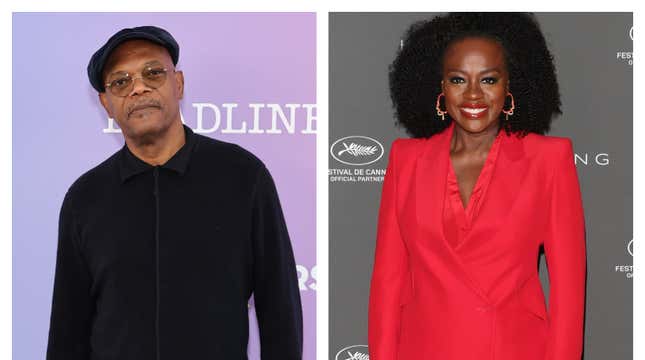
As two of the most successful actors in Hollywood, Samuel L. Jackson and Viola Davis have done and seen it all. The Oscar-winning duo sat down to discuss their long, wide-ranging careers as part of Variety’s Actors on Actors series.
For two actors who are known for portraying fascinating characters, the methods they use to build those characters are particularly interesting. Davis explained the challenge of making someone as beloved and well-known as The First Lady’s Michelle Obama original and new.
“You’re limited by the scope and the depth of the script. Always a pet peeve of mine, number one. Limited by the script. If it’s not there, you have to fill it in, and sometimes that’s almost impossible,” Davis said. “Two, it’s not my job to give you an image of someone you want to see. I need the writer, I need the director, and then, finally, I need the audience. It’s my job to make you feel those moments that you have in private. They may make you squirm, but if you recognize it, then I’ve done my job.”
In The Last Days of Ptolemy Grey, Jackson knew his portrayal of a man going through dementia would make viewers uncomfortable, but that was the point for the Secret Invasion star. He wanted to make the audience feel Ptolemy’s struggle.
“I’ve been living with that book for 12 years or so. I read it once a year because I kept trying to get folks to do it. By the time I had an opportunity to actually portray him, I had a very solid idea of who he was,” Jackson said. “I had that freedom to just go in there and make Ptolemy who I wanted Ptolemy to be. I knew how uncomfortable the first episode would be. But I wasn’t going to run from it and try to make it easy. I’ve played characters that I know people aren’t supposed to like, and enjoyed it, like Stephen in Django [Unchained]. That’s my job, to make you uncomfortable. People go, ‘My God.’ And that’s satisfying for us.”
The deep dive into character had Jackson curious about the How to Get Away with Murder Emmy-winner’s approach to playing someone like Annalise and how she handled working with the continuing story of a series, as opposed to a film that has a definite beginning, middle and end.
“For me, with Annalise, I was given an opportunity, especially as a dark-skinned Black woman, 47 years old. She’s sexualized; she’s sociopathic. It gave me a vessel to be an unpredictable, messy woman,” she said. “And I find that when, for instance, if you see a white woman on-screen, you could say, ‘She looks like my mother.’ A lot of studio heads would say, ‘She could look like my sister, my aunt, the woman who I wanted to marry.’ You see the possibilities. That wasn’t me in my career. My possibilities were the crack addicts, the mothers who were in challenged situations watching their sons die, the ambiguous lawyer or the judge. And I was happy to get them—don’t get me wrong. I made the most of it. But this was the first opportunity I had to play a woman. And it was in the midst of a melodrama. We can admit a lot of the situations were fantastical, but it was still my opportunity to boldly step out and make choices that could surprise people and make people really see me as a woman.”
The pair have known each other since their days starting out in New York, so that led to a fun, honest conversation about working their way up from the stage to films.
“I was in New York, and every now and then, a movie passed through,” Jackson said. “I remember when I got Ragtime in 1980. That was my first time going to London to shoot and be on location. I thought, ‘It’s about to happen.’ I came back to New York. I didn’t see another movie for 10 years. I lost it and I started focusing on the work, especially after I got sober. The work became the thing.”
“When I got my first play at the Public Theater making $250 a week, I was like, ‘It’s a wrap—I’ve made it.’ I always went from job to job. I never thought, ‘I want to be famous,’” Davis added. “The notoriety was just an overflow of the work. Now you have so many actors who are so intentional about where they want to end up.”
These Actors on Actors interviews are always fascinating, but to have two Black acting legends discuss their craft and history is so enlightening. I hope Variety takes note and pairs up more of these stellar talents for a conversation that only two Black actors can have.

